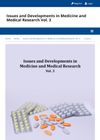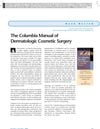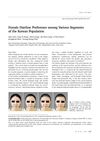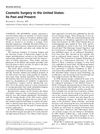 January 1997 in “Journal of Toxicology-cutaneous and Ocular Toxicology”
January 1997 in “Journal of Toxicology-cutaneous and Ocular Toxicology” The book "Hair Replacement" is a detailed guide on hair transplant and treatments, useful for surgeons and clinicians.
[object Object]  October 2023 in “Clinical and experimental dermatology and therapies”
October 2023 in “Clinical and experimental dermatology and therapies” Doctors can quickly learn necessary skills and perform more procedures due to a strong educational system.
11 citations,
May 1957 in “Journal of the American Medical Association” Emollient creams prevent skin dryness and benefit from shared knowledge between cosmetic makers and doctors.
 45 citations,
January 2020 in “Pharmaceutical Biology”
45 citations,
January 2020 in “Pharmaceutical Biology” Dendrobium officinale polysaccharides may help with hair growth, skin moisturization, and protection against oxidative damage.
 January 2022 in “Book Publisher International (a part of SCIENCEDOMAIN International)”
January 2022 in “Book Publisher International (a part of SCIENCEDOMAIN International)” The document concludes that hair doctors should explain hair loss progression to patients and recommend suitable hairline heights to prevent future issues and maintain a natural look.
 1 citations,
December 1989 in “The Journal of Dermatologic Surgery and Oncology”
1 citations,
December 1989 in “The Journal of Dermatologic Surgery and Oncology” To get certified in cosmetic surgery, doctors must pass exams and have specific experience; dermatologists are encouraged to get certified.
10 citations,
November 2017 in “Dermatologic clinics” Men of different ethnicities are more often getting cosmetic treatments, and doctors should consider their specific skin types and cultural standards.
 November 2002 in “Skinmed”
November 2002 in “Skinmed” The book is a practical introduction to cosmetic dermatologic surgery for doctors.
 7 citations,
September 2018 in “Journal of cosmetic dermatology”
7 citations,
September 2018 in “Journal of cosmetic dermatology” A patient had painful swollen lymph nodes after a cosmetic skin and hair treatment, suggesting doctors should warn about this risk.
 July 2013 in “Hair transplant forum international”
July 2013 in “Hair transplant forum international” The UK published guidelines recommending that only qualified medical professionals should perform cosmetic procedures, with the possibility of these guidelines influencing future laws.
 January 2022 in “Maxillofacial Plastic and Reconstructive Surgery”
January 2022 in “Maxillofacial Plastic and Reconstructive Surgery” The book is a detailed guide on facial cosmetic surgery techniques and advancements, useful for both trainees and specialists.
 3 citations,
January 2015 in “Clinical and Experimental Dermatology”
3 citations,
January 2015 in “Clinical and Experimental Dermatology” A man developed a serious muscle breakdown condition after using a hair loss medication not known to cause this side effect.
 November 2009 in “Hair transplant forum international”
November 2009 in “Hair transplant forum international” Doctors should collaborate with the patient's primary care physician to decide if it's safe to stop taking Plavix before hair restoration surgery, considering the risk and benefit.
150 citations,
July 2001 in “Clinics in dermatology” Proper haircare and communication with doctors are key to managing hair loss and avoiding damage.
 7 citations,
January 2018 in “Skin appendage disorders”
7 citations,
January 2018 in “Skin appendage disorders” The document suggests recognizing "trichiatrists" as doctors specializing in hair and scalp health, using evidence-based treatments.
 14 citations,
August 2017 in “Dermatologic surgery”
14 citations,
August 2017 in “Dermatologic surgery” Men are getting more facial fillers, and doctors should use different techniques and fillers for men's unique facial features to get natural results.
[object Object]  January 2017 in “International journal of transplantation & plastic surgery”
January 2017 in “International journal of transplantation & plastic surgery” Hair restoration techniques have improved over time, focusing on better results and less scarring, but skilled doctors are essential for natural-looking outcomes.

Beauty is subjective and culturally variable, but certain facial features like symmetry are universally recognized as attractive.
 April 2018 in “Journal of Aesthetic Nursing”
April 2018 in “Journal of Aesthetic Nursing” Professionals believe voluntary registers cannot ensure public safety like mandatory ones with laws.
 April 2024 in “Remedium Journal about the Russian market of medicines and medical equipment”
April 2024 in “Remedium Journal about the Russian market of medicines and medical equipment” Pharmacy workers need more education to better help people with hair loss.
 1 citations,
November 2008 in “Gerontology”
1 citations,
November 2008 in “Gerontology” Older adults use lifestyle drugs to improve life quality and appearance, but caution is needed due to side effects and potential abuse.
 1 citations,
January 2014 in “Annals of Dermatology”
1 citations,
January 2014 in “Annals of Dermatology” Korean people prefer M-shaped hairlines and lower foreheads, with no major differences across various demographics.
 153 citations,
August 2002 in “Dermatologic Surgery”
153 citations,
August 2002 in “Dermatologic Surgery” Follicular Unit Extraction (FUE) is a less invasive hair transplant method with minimal scarring, suitable for about 60% of patients, especially those needing fewer grafts and quicker recovery.
 1 citations,
June 2021 in “Journal of Cosmetic Dermatology”
1 citations,
June 2021 in “Journal of Cosmetic Dermatology” Enzyme booster SULT1A1 greatly enhances hair regrowth with minoxidil.
 14 citations,
February 1999 in “The BMJ”
14 citations,
February 1999 in “The BMJ” Cosmetic surgery is more popular and cost-effective, but outcomes depend on the surgeon's skill and all procedures have potential complications.
 1 citations,
April 2021 in “Clinical and Experimental Dermatology”
1 citations,
April 2021 in “Clinical and Experimental Dermatology” The COVID-19 pandemic has caused a 57% increase in interest in facial cosmetic procedures, leading to calls for better industry regulation and professional standards.
 7 citations,
November 1999 in “Dermatologic Surgery”
7 citations,
November 1999 in “Dermatologic Surgery” The document concludes that multidisciplinary training is important for future cosmetic surgeons and acknowledges the lasting influence of pioneers in the field.
 August 2024 in “Journal of Cosmetic Dermatology”
August 2024 in “Journal of Cosmetic Dermatology” CGF injections may safely and effectively promote hair growth in androgenetic alopecia patients.
 June 2023 in “Journal of Cosmetic Dermatology”
June 2023 in “Journal of Cosmetic Dermatology” The new follicular unit extraction treatment effectively treats severe hair loss in Asian men, giving natural-looking results with few side effects.
 6 citations,
August 2016 in “Journal of women & aging”
6 citations,
August 2016 in “Journal of women & aging” Older women reported negative physical and psychological effects from Botox and facial fillers, feeling neglected by the medical system.



























